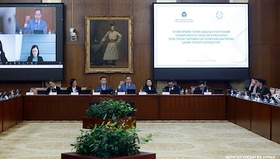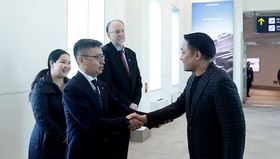Welcome address by G.Zandanshatar, Chairman of the State Great Hural of Mongolia to the Second Regional Seminar for the Asia-Pacific Region Parliaments on Achieving the Sustainable Development Goals
Her Excellency MadamePresident of Inter-Parliamentary Union,
Excellencies,
Ladies and gentlemen,
The Agenda 2030 forSustainable Development is a historic milestone. It is universal and we allhave a responsibility for its implementation. The Sustainable Development Goals represent the most universal, ambitious and comprehensive agenda everseen which promises to leave nobody behind. This is a real paradigm shift which requires us all to act in new ways.
Parliaments, under theleadership of IPU have an important role in translating the goals into concreteactions. A good example is a Hanoi Declaration “The Sustainable DevelopmentGoals: Turning Words into Action” adopted by the 132nd IPU Assembly in Hanoi on1 April 2015.
This Declarationoffers a unique opportunity to meet global challenges, using a universal,integrated approach that applies to all countries and links poverty eradicationto sustainable development.
In May 2017, theparliaments of the Asia-Pacific region met for the first time in Ho Chi MinhCity, Vietnam to discuss concrete steps that would help implement the SDGs intheir countries and the region.
Today we are gatheredhere for the second regional seminar on “Achieving the Sustainable DevelopmentGoals”, which will become an importantlandmark, bringing together Parliamentarians to review progress on the 2030Agenda.
DistinguishedDelegates,
I wish to take thisopportunity to inform you that the State Great Hural of Mongolia has been andremains deeply committed to the achievement of the Sustainable DevelopmentGoals. In 2016, the State Great Hural of Mongolia adopted the "SustainableDevelopment Vision-2030", translating internationally agreed goals to the national level.
In order to ensurepolicy coordination and to find effective ways to hold government accountable,we have established the Subcommittee on Sustainable Development goals. Thesubcommittee is now localizing IPU toolkit – the self-assessment methodology,which will guide its work. In addition to that the Subcommittee is coordinatingSDG review process in order to present a national voluntary report of Mongoliato the High-Level Political Forum in July 2019.
The second session ofthis seminar will focus on education. We believe that ensuring qualityeducation for all is not only central to the achievement of all of the Goals,but in particular the goal to end poverty.
The Education sectoris a top priority for the Mongolian Parliament and the Government. In 2019, 4.7 percent of GDP and 17.2 percentof the state budget revenue was allocated to education. Since 2016, theGovernment has been implementing a comprehensive education reform with aspecial focus on professional development of teachers, improvement of learningenvironment, expanding inclusive education, closing the gap between educationand employment, and life-long learning. In the coming fall session of theParliament, we will discuss and review a revised Education Law, which shouldfacilitate acceleration of SDG-4 implementation.
During this seminar,you will have an opportunity to get more information on education sector reformfrom the report of our 2 Members of Parliament.
DistinguishedDelegates,
Health is a humanright, and despite notable progress, many challenges to achieving SDG3- Goodhealth and well-being remain. One of the successful Government strategicallyimportant programs is the national program “Healthy Liver Mongolia”, whichMongolia has been implementing since 2017 to decrease infection rates.
According to theSustainable Development Vision-2030, Mongolia has set ambitious target toreduce the maternal mortality ratio to 15 per 100,000 live births by 2030. In2018, the maternal mortality ratio reduced to 27.1 due to the GovernmentNational Program on Mother and Child Reproductive Health.
We live in a time ofhuge transformation. The defining challenge is countering climate change. Weneed a course of action to create a low-carbon and climate-resilient economy.
Mongolia is focusingon adaptation to climate change, contribution to climate change mitigation,through introducing ecologically-friendly advanced technologies, increasingefficiency and productivity, and introducing green tax and green procurementsystems designed to reduce environmental pollution and greenhouse gasemissions. The State Great Hural Mongolia has revised the Law on waste (2017),amended Law on water pollution.
Last but not least, Iwould like to stress the important role of engagement of citizens and localcommunities, as well as high quality data in implementation of SDGs. I am surethat during your deliberations, you will find an innovative ways to enhancecitizen interaction and effective communication, and access to big data whichhelps measure the progress towards SDGs.
Madame President,
I appreciate IPU’sleadership and pivotal role in assisting Member States by developing a globalguidelines, toolkits and strategy which help Parliaments to better fulfil theirlegislative roles and responsibilities.
In Mongolian democracy,the Parliament plays a very important role. The new global framework – SDGsgive us a focus for our core purpose – the advancement of democratic values,the rule of law and strong, representative institutions, and the promotion ofgender equality and human rights. Therefore, I have initiated a development ofthe Parliament Strategic Plan just after assuming the Chairmanship of the StateGreat Hural in February this year. Building strong and democratic parliament,promoting gender equality and human rights, reducing inequality are some of keyobjectives of this Strategic Plan.
We believe thisStrategy will facilitate not only advancement towards SDGs but will pave thestrong foundation for democratic governance.
Honorable Delegates,
As you all know lastweek, India's Prime Minister Narendra Modi has won a second term in officefollowing the world's largest democratic exercise ever. I would like to remindyou that historically Mongolia and India are spiritual neighbors. It issymbolic that during the election campaign, Modi occasionally wore Mongoliantraditional costume. This is just one example of fruitful cooperation andpartnership between countries.
Last but not least, wemust celebrate successes, learn from our mistakes and use the best evidence toinform our decisions. We also need to tackle challenges that we are facing.Inequality, air pollution, child violence, low quality of education are keychallenges, Mongolia is struggling to fight.
Time is short – 2030is not far away and resources are finite – we must make important decisionsabout how to invest for the biggest impact.
I wish you everysuccess in your debates and discussions, which I am sure will producesubstantive outcomes.
I sincerely hope thatthis meeting will help to light the way towards accelerated implementation ofSDGs.

 Eng
Eng  Монгол
Монгол

